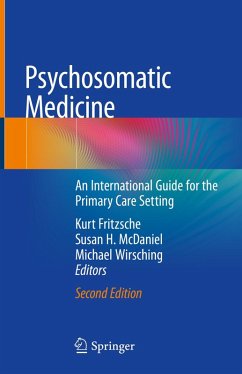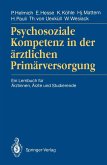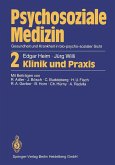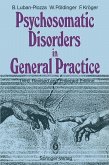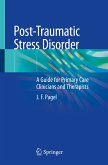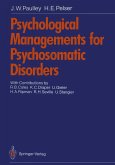Now in its fully revised and expanded second edition, this volume is the definitive global resource on psychosocial problems. Containing several new chapters and featuring extensively updated contributions from experts in the field, this title takes a uniquely global approach in laying the foundations of bio psychosocial basic care and provides relevant information about the most common mental and psychosomatic problems and disorders. An extension of the cultural aspects of the individual clinical pictures and new contributions from China, Latin America, Russia, Iran, India, Africa and Myanmar, also about migration and mental health accompany this revision.
This book is divided into four sections and begins by explaining the relationship between psychosomatic medicine and primary care. The next part outlines the best practices for diagnosing the most common biopsychosocial problems and mastering the most frequent communication challenges(e.g. biopsychosocial anamnesis, breaking bad news, dealing with difficult patients, family and health systems communication and collaboration). The following section delves into more specific psychosomatic problems such as depressive disorders, posttraumatic stress disorder, addiction, the terminally ill patient and eating disorders, among others. The final section focuses on developing psychosomatic medicine in international settings. Every chapter integrates basic theoretical background and practical skills and includes trans-culturally sensitive material, important for work with patients from different nations.
Psychosomatic Medicine: An International Primer for the Primary Care Setting, second edition is a must-have reference for doctors from various specialties as well as nursing staff, social workers and clinical health psychologists.
This book is divided into four sections and begins by explaining the relationship between psychosomatic medicine and primary care. The next part outlines the best practices for diagnosing the most common biopsychosocial problems and mastering the most frequent communication challenges(e.g. biopsychosocial anamnesis, breaking bad news, dealing with difficult patients, family and health systems communication and collaboration). The following section delves into more specific psychosomatic problems such as depressive disorders, posttraumatic stress disorder, addiction, the terminally ill patient and eating disorders, among others. The final section focuses on developing psychosomatic medicine in international settings. Every chapter integrates basic theoretical background and practical skills and includes trans-culturally sensitive material, important for work with patients from different nations.
Psychosomatic Medicine: An International Primer for the Primary Care Setting, second edition is a must-have reference for doctors from various specialties as well as nursing staff, social workers and clinical health psychologists.
Dieser Download kann aus rechtlichen Gründen nur mit Rechnungsadresse in A, B, BG, CY, CZ, D, DK, EW, E, FIN, F, GR, HR, H, IRL, I, LT, L, LR, M, NL, PL, P, R, S, SLO, SK ausgeliefert werden.

